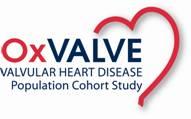
The Oxford Valvular Heart Disease Population Study (OxVALVE) is a large research study of more than 4,000 subjects recruited from GP surgeries. It was established in 2009 because Valvular Heart disease (VHD) is poorly researched in comparison with other heart disease. We aim to discover, via a screening programme of adults aged over 65, whether early detection and treatment of VHD may improve the care pathways and health of patients in the long term. The cohort consists of volunteers over the age of 65, with no known VHD, who have been enrolled from seven GP surgeries within Oxfordshire.
The study is now in Phase 2, following-up participants to examine how often and how rapidly valve disease progresses
People who have taken part in screening for OxVALVE discuss their experiences of undergoing the screening, receiving their results, and ongoing participation in the study.
Objectives
Phase 1:
- To discover the proportion of the population over 65 years of age within Oxfordshire who have VHD, via a screening programme based in GP surgeries.
- To find out how acceptable this screening process is to patients, and any problems it brings to both them and the health service.
- To identify the associated conditions that are linked to valve disease
- To identify any biological markers that might indicate the presence of valve disease and/or it’s likely progression
Phase 2:
- Medium-term follow-up of OxVALVE participants five years after initial recruitment to the study. It aims to define the rates of disease progression, risk markers for prognosis, and whether mild VHD is of clinical concern.
- We assess activity levels, quality of life, and other impacts in subjects with and without valve disease.
- We hope that our study of VHD will enable us to predict those who will require treatment to improve patient clinical outcomes. Conversely, we aim to identify those people who can be reassured that their valve disease does not require follow-up.
What’s measured?
- Demographics and a medical history are obtained and a screening echocardiogram blood pressure and ECG are performed on each subject.
- Blood samples are obtained for future research / DNA analysis.
- Over 50% of those invites attended the screening programme, ratio male to female 1:1.
- Phase two; five year follow up visits are now underway, the return rate for participants is approx. 65%
Achievements
- Publication of the first 2,500 participant data in European Heart Journal June 2016.
- OxVALVE results from the first 2,500 participant’s data have been presented by Prof Prendergast at several key conferences.
- Valvular Heart Disease (VHD) has been detected in 51% overall with strong age relationship (the proportion rises to 71% in over-85s).
- Echo screening for VHD has been proven to be both feasible and acceptable to patients.
- VHD has been found to affect 45% of the population over 65 years of age, of which less than 6.4% are moderate or severe. Prevalence of VHD increased linearly with age.
- A steering committee has been established to manage future OxVALVE projects, and cultivate links with other clinical research groups.
- NHS Digital data linkage study on mortality undertaken with Primary Care Academic Group.
- Several data mining projects completed.
- Quantitative studies of valve disease with Cardiovascular Magnetic Resonance have demonstrated the ability to predict patients likely to require valve surgery in the near future.
- OxVALVE has quantified the current burden of undiagnosed valve disease in the population.
- OxVALVE has allowed estimates of the predicted increasing burden of moderate/severe VHD due to the ageing population.
- Preliminary findings from OxVALVE suggest that mild disease is very common in the general population, and may not require further follow-up.
Collaborations
- Clinical Cardiovascular Research Facility (CCRF), University of Oxford
- GE Healthcare
- NIHR Oxford Biomedical Research Centre
- School for Primary Care Research
- Echo normal study
- OxVasc Study
- GE Healthcare
- Novacor
Principal Investigators
Prof Bernard Prendergast & Prof Saul Myerson
Address: The OxVALVE Study Office, Room B15, Level 0, Cardiac Investigation Annexe, John Radcliffe Hospital, Headington, Oxford OX3 9DU
Phone: 01865 228927